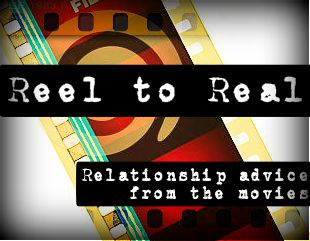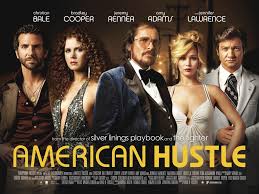"American Hustle" - Who's Zooming Whom?
The success of “American Hustle” proves what we already know: that Americans love to watch the hustle in action, and I’m not talking about the 70s disco dance move. We like to watch clever people outwit each other in games of sex, politics and money. It helps if the people are witty and glamorous, or at least attractive and interesting, and are hellbent on outfoxing each other in the bedroom as well as in their petty schemes.
But what works on screen does not work in real life. In real life, Rosalyn (the Jennifer Lawrence character) chooses a gangster who apparently beats her, or at least is careless about her wellbeing in how he treats her, judging by the neck brace she is wearing and which she unconvincingly blames on a car accident the last time we see her. Is her life a life that any woman wants? I say no. It is sad and tawdry and I feel pity for her in that last scene.
Also, what doesn’t work in real life is a romance like Sydney and Irving’s. We are supposed to be believe that these two con artists are honest with each other while eagerly taking advantage of others. Remember the loan sharking scenes? An ordinary honest person would not be able to lie and cheat other people in that way: systematically, repeatedly, without remorse. What if those desperate and poor people looking for loans had been your neighbors, your local bartender or your car mechanic pal down the block? OK, maybe we overlooked some of their ripoff behavior because we wanted to believe that Irving and Sydney only ripped off other petty con artists like themselves. But look at the evidence in the movie. It did not seem that way. It seemed they were happy to climb over some pretty ordinary people just to make a buck. Would I want to be friends with Sydney and Irving? No, I would not.
Having lived lives of petty crime and antisocial activities, the final scene in which Irving and Sydney apparently are raising a happy kid in happy suburbia seems so fake. Leopards do not change their spots. What about all those unhappy people they ripped off? It’s hard to believe they can escape their past so easily. And by the way, where was their repentance? Did they make any amends to their victims? All of that was basically smoothed over so we could enjoy the ride. But as it turned out, the ride was as cheap and fake as one of those Atlantic City bumper car rides. Still, it was fun while it lasted, even though “American Hustle” left me feeling hustled.
The success of “American Hustle” proves what we already know: that Americans love to watch the hustle in action, and I’m not talking about the 70s disco dance move. We like to watch clever people outwit each other in games of sex, politics and money. It helps if the people are witty and glamorous, or at least attractive and interesting, and are hellbent on outfoxing each other in the bedroom as well as in their petty schemes.
But what works on screen does not work in real life. In real life, Rosalyn (the Jennifer Lawrence character) chooses a gangster who apparently beats her, or at least is careless about her wellbeing in how he treats her, judging by the neck brace she is wearing and which she unconvincingly blames on a car accident the last time we see her. Is her life a life that any woman wants? I say no. It is sad and tawdry and I feel pity for her in that last scene.
Also, what doesn’t work in real life is a romance like Sydney and Irving’s. We are supposed to be believe that these two con artists are honest with each other while eagerly taking advantage of others. Remember the loan sharking scenes? An ordinary honest person would not be able to lie and cheat other people in that way: systematically, repeatedly, without remorse. What if those desperate and poor people looking for loans had been your neighbors, your local bartender or your car mechanic pal down the block? OK, maybe we overlooked some of their ripoff behavior because we wanted to believe that Irving and Sydney only ripped off other petty con artists like themselves. But look at the evidence in the movie. It did not seem that way. It seemed they were happy to climb over some pretty ordinary people just to make a buck. Would I want to be friends with Sydney and Irving? No, I would not.
Having lived lives of petty crime and antisocial activities, the final scene in which Irving and Sydney apparently are raising a happy kid in happy suburbia seems so fake. Leopards do not change their spots. What about all those unhappy people they ripped off? It’s hard to believe they can escape their past so easily. And by the way, where was their repentance? Did they make any amends to their victims? All of that was basically smoothed over so we could enjoy the ride. But as it turned out, the ride was as cheap and fake as one of those Atlantic City bumper car rides. Still, it was fun while it lasted, even though “American Hustle” left me feeling hustled.
What "Gravity" tells us about finding a path out of despair
(SPOILER ALERT)

Sandra Bullock's character Dr. Ryan Stone is sent on a dramatic journey in her latest film, "Gravity," hurtling through thousands of miles through space while watching her oxygen and fuel supplies rapidly dwindle.
Even more significantly, though, Ryan undergoes an emotional journey that is just as intense.
When we meet Ryan she is grieving the loss of her young daughter. Ryan talks about living without joy, just going to work and driving. She has lost her motivation.
Then, Ryan is put to the test. She must struggle to survive in a high-risk situation that pushes her to her limits, physically and mentally. In an stark moment, her coworker realizes that their current momentum threatens both their lives, and the only possibility of survival is for Ryan. In that realization he removes himself, facing certain death.
His sacrifice, while ostensibly rational in a zero-sum world of bad choices, is an emotional wake-up call for Ryan. Her instinct to survive had been weakening. Now she feels an emotionally compelling reason to survive to make his sacrifice meaningful. Also, she realizes that the best tribute to her daughter, and the most redeeming thing she can do, is to fight with all her might to live a vital and meaningful life.
In my opinion, while the movie seems like it is a struggle of man vs. nature, in the form of an astronaut fighting to survive against otherworldly and powerful space forces, it is actually man vs. himself. In this case, a woman takes the lead role. She must overcome the inertia and despair that is keeping her from fully living.
Reel to Real: Advice from the movies - SUMMARY: Astronaut Dr. Ryan Stone proves that using your head can save your life, but using your heart can give you more reasons to live.
Even more significantly, though, Ryan undergoes an emotional journey that is just as intense.
When we meet Ryan she is grieving the loss of her young daughter. Ryan talks about living without joy, just going to work and driving. She has lost her motivation.
Then, Ryan is put to the test. She must struggle to survive in a high-risk situation that pushes her to her limits, physically and mentally. In an stark moment, her coworker realizes that their current momentum threatens both their lives, and the only possibility of survival is for Ryan. In that realization he removes himself, facing certain death.
His sacrifice, while ostensibly rational in a zero-sum world of bad choices, is an emotional wake-up call for Ryan. Her instinct to survive had been weakening. Now she feels an emotionally compelling reason to survive to make his sacrifice meaningful. Also, she realizes that the best tribute to her daughter, and the most redeeming thing she can do, is to fight with all her might to live a vital and meaningful life.
In my opinion, while the movie seems like it is a struggle of man vs. nature, in the form of an astronaut fighting to survive against otherworldly and powerful space forces, it is actually man vs. himself. In this case, a woman takes the lead role. She must overcome the inertia and despair that is keeping her from fully living.
Reel to Real: Advice from the movies - SUMMARY: Astronaut Dr. Ryan Stone proves that using your head can save your life, but using your heart can give you more reasons to live.

